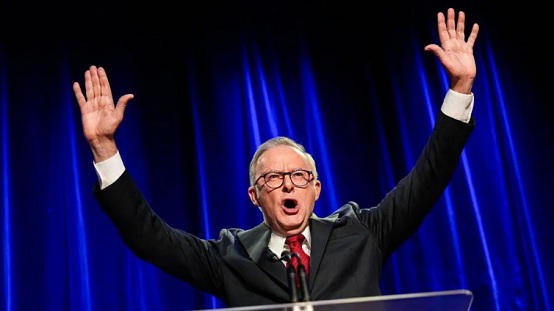Anthony Albanese has become the first Australian prime minister to win a second consecutive three-year term in two decades, in a dramatic comeback for his Labor Party in a general election dominated by the cost-of-living crisis.
The Labor Party was on track on Saturday for an unexpectedly large parliamentary majority, as Peter Dutton, leader of the conservative Liberal Party, conceded defeat, having lost his own seat.
In his victory speech, left-leaning Albanese pledged to steer the nation through a rough patch of global uncertainty.
“Australians have chosen to face global challenges the Australian way, looking after each other while building for the future,” he told supporters in Sydney.
“We do not need to beg or borrow or copy from anywhere else. We do not seek our inspiration overseas. We find it right here in our values and in our people.”
Australia’s public broadcaster ABC projected that Labor was on track to win 85 seats in the House of Representatives, easily surpassing the 76-seat threshold needed to reach a majority.
Results in the Senate were still unclear. While Labor could pick up some seats, it may still need the support of minor parties, such as the Greens or independents, to pass legislation.
During his victory speech, Albanese said the Australian people had voted for “Australian values”.
“For fairness, aspiration and opportunity for all,” he said amid a loud cheer. “In this time of global uncertainty, Australians have chosen optimism and determination.”
Meanwhile, Dutton of the main opposition Liberal Party accepted full responsibility for the poor election results on what he called a “historic occasion” for the party.
Dutton also lost his own Dickson seat to Labor’s Ali France, a former journalist and disability advocate who has pushed for easing the cost of living through tax cuts, cheaper medicine, and investment in public healthcare and education.
Senator James Paterson, a Liberal spokesperson, suggested “the Trump factor” was in play in Australia, in reference to United States President Donald Trump.
Trump had cast a long shadow over the six-week election campaign, leading to keen global interest in whether his tariff-induced economic chaos would influence the result.
The high cost of living, healthcare, housing prices and clean energy were also some of the top issues for Australian voters in the election.
Reporting from Sydney, Al Jazeera’s Jessica Washington said it was a historic win for the Labor Party.
“There was certainly a message of unity by the prime minister. There was also a short moment during his speech when the crowd began to boo Peter Dutton, and he immediately hushed them and said that wasn’t the Australian way,” she said.
“Labor has pledged to make it easier for young people to buy homes and has also made promises, including a 20 percent cut to student debt,” Washington added.
“This makes the loss doubly embarrassing for the opposition coalition because they are often seen as the economic managers, but they lost in an election held largely around those issues.”
The election results extend the Labor Party’s return to power after nearly a decade in opposition.
In the last election, in 2022, Labor secured a parliamentary majority, winning 77 seats out of 151 in the House of Representatives.





